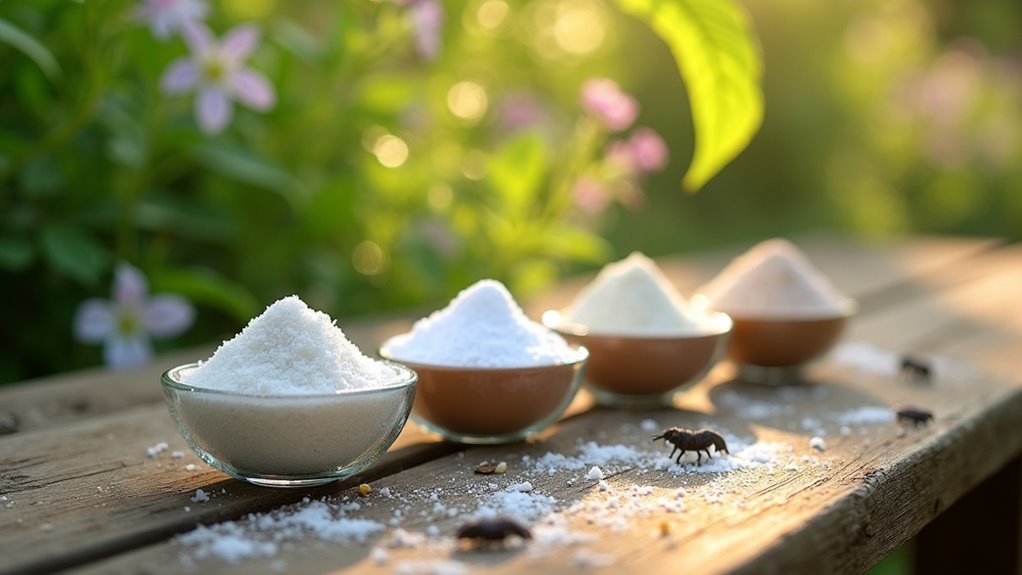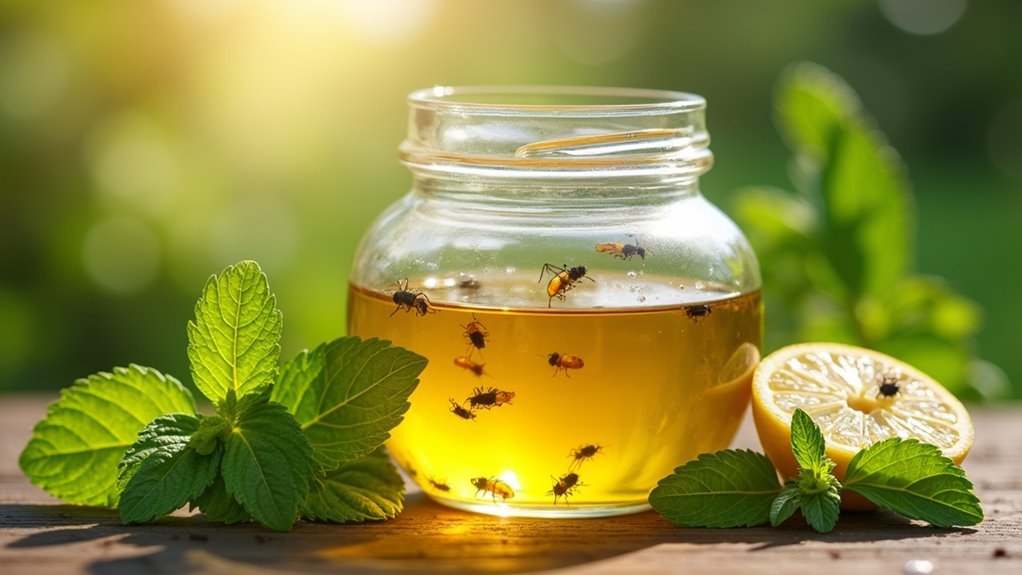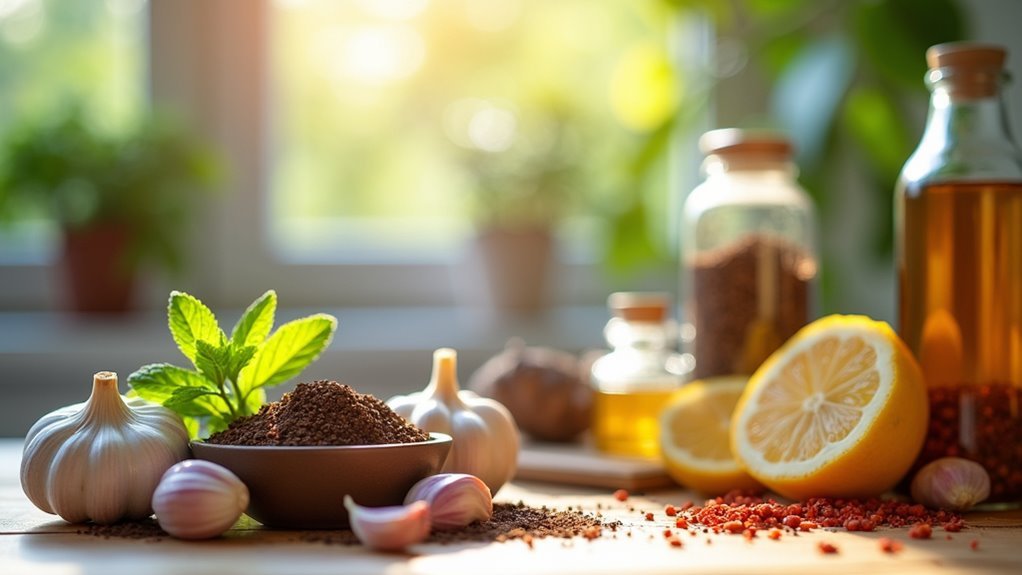You can tackle garden pests with common kitchen ingredients like soap and water spray for aphids, garlic-onion blends for chewing insects, and baking soda-sugar baits for crawlers. White vinegar disrupts ant trails, while vegetable oil mixtures suffocate spider mites. Coffee grounds deter slugs, cayenne pepper repels mammals, and cornmeal eliminates ant colonies. Dish soap combined with cooking oil creates an effective spray for flying pests. These natural solutions offer safer alternatives that’ll protect your garden throughout the growing season.
Soap and Water Spray for Soft-Bodied Insects

When soft-bodied insects like aphids, spider mites, and whiteflies invade your garden, you’ll find that a simple soap and water spray can effectively eliminate these pests by suffocating them with the soap’s coating.
This natural pest control method works as an excellent insecticidal soap alternative.
To create your homemade solution, mix one and a half teaspoons of mild liquid soap with one quart of water.
Make certain you’re using soap without additives or fragrances that could damage plants.
Apply the mixture directly onto affected surfaces during early morning or late afternoon to prevent sun damage.
Test a small plant area first for adverse reactions.
Reapply every 5-7 days or after rain to maintain protection against pest infestations and keep soft-bodied insects under control.
Garlic and Onion Repellent for Chewing Pests
You can create a powerful natural deterrent against chewing pests by combining garlic and onion into a homemade spray. This pungent mixture effectively repels aphids, caterpillars, and beetles while potentially attracting beneficial predators to your garden. The preparation process is straightforward, and proper application timing guarantees maximum effectiveness against stubborn chewing insects.
Preparation and Mixing Methods
Three simple ingredients create an effective garlic and onion repellent that’ll keep chewing pests away from your garden plants.
This kitchen ingredients preparation harnesses strong natural odors that deter aphids, caterpillars, and other destructive insects.
Follow these steps for proper preparation:
- Blend one garlic bulb and one small onion with water until you achieve a smooth consistency.
- Strain the mixture thoroughly to remove any solid particles that could clog your spray bottle.
- Transfer the liquid into a clean spray bottle for easy application.
- Test on a small plant area first to verify no adverse reactions occur.
Store your homemade repellent in the spray bottle and apply full-strength to leaf surfaces.
This natural solution effectively protects your garden without harsh chemicals.
Application and Effectiveness
Since proper timing maximizes your repellent’s effectiveness, apply the garlic and onion spray during early morning or late evening hours to prevent potential leaf burn from intense sunlight. This DIY solution using common kitchen ingredients targets chewing pests effectively when applied every 5-7 days directly onto affected plants.
| Application Schedule | Target Areas |
|---|---|
| Every 5-7 days | Affected plant surfaces |
| Early morning hours | Undersides of leaves |
| Late evening application | Pest hiding spots |
| Maximum efficacy timing | Complete plant coverage |
Your garlic and onion repellent remains potent for two weeks when stored properly, making it a cost-efficient addition to your pest management plan. Focus application on leaf undersides where aphids, cabbage worms, and caterpillars typically hide. This pest control method disrupts feeding behavior through strong odors.
Baking Soda and Sugar Bait for Crawling Insects

When common crawling insects like roaches and ants invade your garden or home, a simple mixture of equal parts baking soda and sugar creates an effective, chemical-free solution.
This natural pest control method works brilliantly—the sugar attracts crawling insects while the baking soda disrupts their digestive systems upon consumption.
This safe for pets approach offers several advantages over traditional pesticides:
- Cost-effective – Uses common kitchen ingredients you already own
- Non-toxic – Avoids harmful chemicals found in commercial sprays
- Targeted – Specifically attracts crawling pests without affecting beneficial insects
- Easy application – Simply sprinkle where you’ve observed insect activity
For effective bait performance, refresh the mixture every few days.
While this natural method is generally safe, prevent pets and children from consuming large quantities to avoid gastrointestinal upset.
White Vinegar Solution for Ant Control
White vinegar offers another powerful weapon in your natural pest control arsenal, particularly when dealing with persistent ant problems. Its strong acidity disrupts scent trails that ants follow, preventing their return to previously invaded areas.
You’ll want to create a simple solution using equal parts white vinegar and water, then spray it directly on ant trails and entry points around your home. This natural deterrent’s pungent odor repels ants and other household pests effectively.
For enhanced results with your pest control solutions, add several drops of dish soap to help the mixture stick to surfaces better. Don’t forget to apply this treatment around garden perimeters, creating protective barriers that reduce infestations and shield your plants from damage while addressing various pest issues naturally.
Vegetable Oil Mixture for Aphid Management

Although aphids can quickly overwhelm your garden plants, you’ll find that a simple vegetable oil mixture provides an effective, eco-friendly solution for managing these destructive soft-bodied pests.
A simple vegetable oil mixture offers an effective, eco-friendly solution for managing destructive aphids in your garden.
This vegetable oil treatment enhances insecticidal properties while remaining safe for your plants and environment.
Here’s how to maximize your aphid management strategy:
- Mix one cup vegetable oil with one tablespoon mild soap to create your concentrated solution.
- Dilute two teaspoons of mixture in one quart of water before application.
- Spray directly on affected plants, targeting both leaf surfaces where pest activity occurs.
- Apply during early morning or late afternoon to prevent sun damage.
Reapply every 5-7 days or after rainfall to maintain consistent protection against aphid resurgence.
Citrus Peel Spray for General Pest Deterrent
Beyond targeting specific pests like aphids, you can create a versatile citrus peel spray that repels multiple garden invaders naturally.
This natural insecticide works because citrus peels contain compounds that effectively deter household pests like ants and fruit flies. To make your citrus peel spray, boil the peels in water, strain the mixture, and apply it directly to plants as a pest deterrent.
The high acidity in citrus solutions creates an unwelcoming environment for invaders while remaining safe around beneficial insects.
Unlike harsh chemical pesticides, these eco-friendly solutions pose minimal environmental risk. You’ll need to reapply regularly for maximum effectiveness, but this natural approach provides a sustainable alternative that protects both your garden and the ecosystem.
Coffee Grounds as Slug and Snail Barrier
When slugs and snails threaten your garden’s tender plants, used coffee grounds provide an excellent natural defense that’s both effective and sustainable.
This simple pest control method creates an abrasive barrier that these pests won’t cross, while the caffeine content proves toxic to slugs and snails.
To maximize your coffee grounds slug barrier effectiveness:
- Apply a one-inch layer around plant bases for ideal protection
- Refresh after rain or watering to maintain barrier integrity
- Mix into soil to improve soil drainage and aeration
- Allow decomposition to naturally add nitrogen to your garden
These natural deterrents offer dual benefits – protecting your plants while enriching the soil.
Coffee grounds represent one of the most accessible pest control methods available to home gardeners.
Cayenne Pepper Dust for Mammal Protection
You can protect your garden from rabbits, deer, and other hungry mammals by sprinkling cayenne pepper dust directly on vulnerable plants or around garden borders.
This natural deterrent works best when you mix it with flour or diatomaceous earth to create a more substantial barrier that mammals won’t cross.
Remember to reapply the mixture after rain or watering since moisture reduces its effectiveness.
Cayenne Application Methods
Although chemical repellents can damage plants and soil, cayenne pepper dust offers a natural, effective solution for protecting your garden from hungry mammals.
These application methods guarantee maximum deterrent effect when creating your barrier:
- Mix ratio: Combine cayenne pepper with flour or cornmeal in a 1:1 ratio for better adhesion.
- Perimeter dusting: Sprinkle the mixture around garden edges to create an effective boundary.
- Direct plant treatment: Apply directly onto vulnerable plants that mammals frequently target.
- Maintenance schedule: Reapply after rainfall or heavy watering to maintain protection.
For enhanced results, combine cayenne with other natural repellents like vinegar or garlic powder.
This multi-layered approach creates a more potent defense system against deer, rabbits, and other garden invaders.
Target Mammal Pests
Several common garden mammals fall victim to cayenne pepper’s natural deterrent properties, making this spicy solution particularly effective against specific unwanted visitors.
Rabbits represent primary targets for this repellent, as they’re sensitive to capsaicin’s burning sensation when nibbling treated plants. Deer also respond strongly to cayenne pepper dust, avoiding areas where you’ve applied the natural pest control method.
Squirrels, chipmunks, and groundhogs similarly dislike the spicy irritation this deterrent creates.
You’ll find cayenne pepper works best against mammal pests that rely heavily on smell and taste when foraging. These animals’ sensitive nasal passages and mouths react immediately to the pepper’s heat, causing them to seek food sources elsewhere.
This natural approach provides consistent control without harming the targeted mammals or your garden plants.
Reapplication After Rain
When raindrops wash away your carefully applied cayenne pepper dust, you’ll need to act quickly to restore your garden’s natural defense system. This natural deterrent loses effectiveness when wet, leaving your plants vulnerable to hungry mammals like rabbits and deer.
Here’s your reapplication strategy:
- Check after every rainfall – Inspect your garden immediately following rain or heavy watering.
- Apply fine dusting – Sprinkle fresh cayenne pepper around vulnerable plants’ base and foliage.
- Mix with diatomaceous earth – Combine these ingredients for enhanced pest control and longer-lasting protection.
- Monitor mammal activity – Regular reapplication reduces frequency of visits, promoting healthier garden ecosystem.
Consistent reapplication guarantees continuous protection against mammal damage while maintaining your garden’s natural defense barrier throughout growing season.
Cornmeal Treatment for Ant Colonies
Ants marching through your garden can become a distant memory with a simple pantry staple you likely already own. Cornmeal serves as an effective pest control method that disrupts ant colonies’ digestive processes, leading to their elimination.
This eco-friendly solution offers a non-toxic alternative to chemical pesticides, keeping your garden safe for pets and humans.
Sprinkle cornmeal directly where you’ve observed ant activity to attract them to this lethal bait. However, you’ll need to maintain garden cleanliness since ants will ignore cornmeal if other food sources are available.
For enhanced effectiveness against stubborn colonies, combine cornmeal with other natural deterrents like borax. This powerful combination creates a thorough approach to eliminating persistent ant problems throughout your garden.
Dish Soap and Cooking Oil Combination for Flying Insects
You’ll find that a simple dish soap and cooking oil combination creates an effective spray for eliminating flying garden pests.
This homemade solution targets aphids, whiteflies, and spider mites by suffocating them and breaking down their protective outer layers.
Let’s explore the specific recipe and identify which flying insects you can successfully control with this treatment.
Oil Soap Spray Recipe
While commercial insecticides can be expensive and potentially harmful to beneficial insects, an oil soap spray offers a safe, budget-friendly alternative that’ll effectively eliminate flying pests like aphids and whiteflies.
This homemade solution uses common household ingredients—vegetable oil and mild dish soap—to suffocate pests in your garden upon contact.
Creating your oil soap spray requires these steps:
- Mix one cup of vegetable oil with one tablespoon of mild dish soap to create your concentrate.
- Dilute two teaspoons of this mixture with one quart of water for application.
- Apply during early morning or late evening to prevent leaf burn from direct sunlight.
- Ascertain thorough coverage on both leaf surfaces, testing on a small area first.
Target Flying Pest Species
This powerful oil soap spray proves particularly effective against several common flying garden pests that can devastate your plants.
You’ll find this DIY pest solution works exceptionally well against insects like aphids, which cluster on stems and leaf undersides, draining crucial plant nutrients.
Whiteflies also succumb quickly to this liquid soap combination, as the oil spray suffocates them upon contact.
These common garden invaders can’t escape the coating action that blocks their breathing pores.
Unlike commercial pesticides or fundamental oils, this homemade pest spray targets flying insects through physical rather than chemical means.
You’re fundamentally creating a barrier that prevents these pests from surviving, making it an environmentally friendly approach to protecting your garden from destructive flying insects.
Frequently Asked Questions
What Is the Best Homemade Pesticide for Vegetable Gardens?
You’ll find soap spray most effective for vegetable gardens. Mix one-and-a-half teaspoons mild liquid soap with one quart water. It’s highly effective against soft-bodied pests like aphids and spider mites.
Can You Use Vinegar and Dawn as Insecticide?
You can use vinegar and Dawn as an effective insecticide. Mix one part vinegar with three parts water, add Dawn drops, then spray on plants to disrupt pest feeding and suffocate insects naturally.
Does Spraying Vinegar on Plants Keep Bugs Away?
Spraying vinegar on plants can keep bugs away since its acidic nature and pungent odor deter pests like ants, fruit flies, and gnats. You’ll disrupt their feeding patterns and erase scent trails effectively.
What Is the Recipe for Garden Pests?
You’ll need two garlic bulbs pureed with water, then strain. Mix equal parts vinegar and water for ant trails, or combine soap with water targeting aphids and soft-bodied insects effectively.
In Summary
You’ve now got nine powerful pest control solutions right in your kitchen cabinets. These natural alternatives won’t harm beneficial insects or contaminate your soil like commercial pesticides do. Start with the gentlest option for your specific pest problem, and don’t hesitate to combine methods for stubborn infestations. Remember to reapply treatments after rain and test solutions on small plant areas first. Your garden will thank you for choosing safer, eco-friendly protection.





Leave a Reply